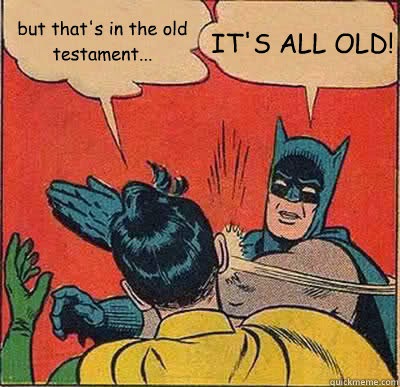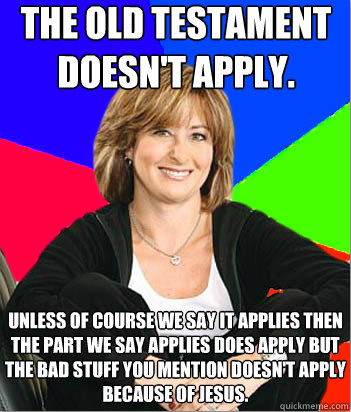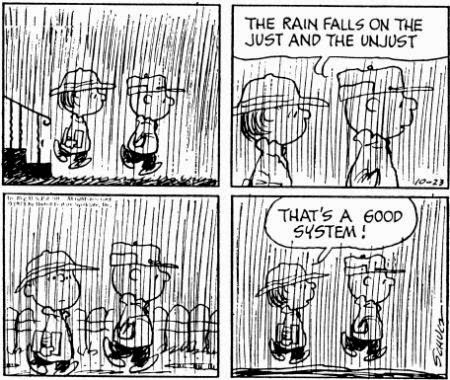The Sermon on the Mount: “A More Excellent Way”
Matthew 5
LDS manual: here
Purpose
To show that some of the teachings of the Sermon on the Mount are terrible, and that it allows believers to selectively jettison inconvenient doctrine from the Old Testament
Reading
This time, we’re starting on the Sermon on the Mount
Matthew 5:1 And seeing the multitudes, he went up into a mountain: and when he was set, his disciples came unto him:
which was actually taught on a plain.
Luke 6:17 And he came down with them, and stood in the plain
Seriously, were any of these Bible writers actually there? Oh, wait; no, they weren’t. This was probably written 30 or 40 years after Jesus would have died. As mentioned in this Thinking Atheist podcast, it was written originally in Greek — not Aramaic, the language Jesus would have spoken — which points to a later writing date.
Main ideas for this lesson
Some of the teachings of the Sermon on the Mount are terrible
People just love the Sermon on the Mount because many of its teachings are nice. They’re all about the lerv. A closer reading shows that many of these teachings are nonsense, and a real supernatural being could do a lot better.
The Sermon on the Mount has been thoroughly fisked a number of times, and here are some of my faves.
You should definitely check them out. But here are a few of my ideas.
Matthew 5:3 Blessed are the poor in spirit: for theirs is the kingdom of heaven.
5:4 Blessed are they that mourn: for they shall be comforted.
5:5 Blessed are the meek: for they shall inherit the earth.
5:6 Blessed are they which do hunger and thirst after righteousness: for they shall be filled.
5:7 Blessed are the merciful: for they shall obtain mercy.
5:8 Blessed are the pure in heart: for they shall see God.
5:9 Blessed are the peacemakers: for they shall be called the children of God.
Well, those are just lovely. One problem: while being meek works out great for those in power, it doesn’t do much to help to help you out of a bad situation. Does a belief that God will sort everything out comfort you, or just put you back to sleep? Frank Zappa suggests that helping each other out would be a better way to turn things around.
Frank Zappa- The Meek Shall Inherit Nothing… by WarGodIII
Lyrics
Light
Here’s another one:
Matthew 5:14 Ye are the light of the world. A city that is set on an hill cannot be hid.
5:15 Neither do men light a candle, and put it under a bushel, but on a candlestick; and it giveth light unto all that are in the house.
In my upbringing, this meant: Everyone knows you’re a Mormon, and they’re watching you. Don’t let your behaviour reflect badly on the Church.
This has a number of effects: It controls your behaviour, serving as a kind of panopticon where you’re always being observed. It also gives you the idea that how you feel about what you’re doing is less important than how others feel about what you’re doing. And that means that you can’t really trust your own moral instincts, because it’s always someone else evaluating your behaviour. You have to imagine what morality looks like to some external observer, guess what they expect, and then do that. It’s like giving someone an moral-sense-ectomy, so that you can replace it with whatever you want.
It’s one tiny scripture, but the church does this in lots of ways, and the effect is cumulative.
Let your light shine?
When you do good things, you’re supposed to let them be seen.
Matthew 5:16 Let your light so shine before men, that they may see your good works, and glorify your Father which is in heaven.
Oh, wait; no, you’re not. Very next chapter:
Matthew 6:1 Take heed that ye do not your alms before men, to be seen of them: otherwise ye have no reward of your Father which is in heaven.
It’s very difficult to know how publicly righteous you’re supposed to be.
Is the Old Testament still valid?
How many times have you had a discussion with a believer about the barbarity of the Bible, and they say, “But that’s the Old Testament!”?
Well, in this section, Jesus sets out the relationship between his teachings and those of the Old Testament.
Matthew 5:17 Think not that I am come to destroy the law, or the prophets: I am not come to destroy, but to fulfil.
5:18 For verily I say unto you, Till heaven and earth pass, one jot or one tittle shall in no wise pass from the law, till all be fulfilled.
5:19 Whosoever therefore shall break one of these least commandments, and shall teach men so, he shall be called the least in the kingdom of heaven: but whosoever shall do and teach them, the same shall be called great in the kingdom of heaven.
This sounds to me like the kind of thing that would have been written way later, once the early Christians were trying to allay criticism that they were getting away from their Jewish base.
Anyway: So what’s the deal? Is the OT still in force? The OT certainly says so; in numerous places it says it was intended to last as a perpetual statute forever.
Lev. 23: 14 …it shall be a statute for ever throughout your generations in all your dwellings.
Num. 19:21 And it shall be a perpetual statute unto them…
And Jesus says as much: Things things won’t be done away “till heaven and earth pass”.
But Christians argue that the OT has been superseded. In the words of the Jehovah’s Witness guy that came to my house yesterday, Jehovah gave us the Ten Commandments in the OT, and the Two Commandments (love God, love your neighbour) in the New. Sort of a version update. This seems to be what they mean by Jesus ‘fulfilling’ the law. (Which is confusing, because “heaven and earth” haven’t passed away yet, and here it is fulfilled already. Oh, well.)
If that’s the case, and the OT has been deprecated, then why do Christians still cherry-pick laws from it that they like?
As mentioned in this lesson, some Christians like to cite the homophobic scriptures in Leviticus, but ignore the shellfish prohibition in the very same book.
A fact lampooned in “Prop 8: The Musical”. Remember that?
While there are mountains of explanations from Christians trying to sort this out, the fact remains: The relationship between the Old Testament and the New Testament is confusing, and this confusion allows Christians to play it both ways. They can pull anything they want from the Old Testament that suits their purpose because Bible, but they can selectively disavow chapters and chapters full of stuff they find unpalatable. This should, however, cast some doubt on just how much they “believe” the Bible.
And what’s often forgotten in this discussion is that (for Mormons and Trinitarians) Jesus is Jehovah. Why wouldn’t he be okay with what he commanded earlier? It makes no sense in terms of a coherent narrative from an unchanging god, but it makes loads of sense in terms of human cultural evolution, which Christianity is a prime example of.
Thinking is not doing
Jesus gives a teaching from the School of Emotional Repression:
Matthew 5:21 Ye have heard that it was said of them of old time, Thou shalt not kill; and whosoever shall kill shall be in danger of the judgment:
5:22 But I say unto you, That whosoever is angry with his brother without a cause shall be in danger of the judgment: and whosoever shall say to his brother, Raca, shall be in danger of the council: but whosoever shall say, Thou fool, shall be in danger of hell fire.
Being angry is nowhere near as serious as killing someone. This teaching is ridiculous.
Note also that atheists are called ‘fools’ in the OT. Man, Jesus sure could use some help from a modern Christian to get himself sorted out!
Adultery in your heart
Matthew 5:27 Ye have heard that it was said by them of old time, Thou shalt not commit adultery:
5:28 But I say unto you, That whosoever looketh on a woman to lust after her hath committed adultery with her already in his heart.
Seriously, Jesus? Impulse control is a fine thing, but this crosses the line into thoughtcrime. In my youth, I wasted a lot of effort trying to stop naughty thoughts from crossing my mind, and feeling bad when I couldn’t. As an adult, I enjoy my sense of eroticism at baseline levels. We are sexual beings, and while we put it on background for much of our day-to-day lives, trying to deny this aspect of our personality is damaging, and makes us act like sexually repressed weirdos. What a terrible lack of perspective to equate sexual desire with unconstrained rutting.
There’s more. If thinking about sex is equated with doing it — if there’s no line between the two, then it eradicates the line between normal stuff people do (like hugging, smooching, etc) and things that are truly messed up (like sexual assault). Have a read of this treatment of the toxic purity culture of American Christianity (as it pertains to the notorious Duggar family), and how it makes inappropriate sexual behaviour not only possible, but likely.
The huge problem with this teaching is that it does not distinguish between having thoughts and desires, and acting on them in an inappropriate way. To the young person, just developing (one hopes) critical thinking skills, this can and does lead to problems in making decisions. After all, if one has already fallen into sexual sin in the realm of thought, why not at least get some satisfaction for the trouble. All the guilt and shame is already there, so why not try to at least get a little gratification.
Needless to say, this worldview is not very good at addressing the issue of consent. Since all sexual sin is the same…, then the difference between lusting and sexually assaulting someone is blurred.
More extreme beliefs follow.
Matthew 5:29 And if thy right eye offend thee, pluck it out, and cast it from thee: for it is profitable for thee that one of thy members should perish, and not that thy whole body should be cast into hell.
5:30 And if thy right hand offend thee, cut it off, and cast it from thee: for it is profitable for thee that one of thy members should perish, and not that thy whole body should be cast into hell.
It’s off with the hands and eyes for a lot of you.
(Funny that it mentions the right hand specifically, by the way.)
Just one more thing from this bit: this is the first time we’ve seen where Jesus mentions ‘hell’. He’ll have more to say about this — including actual fire! — but let’s make a note of this and move on.
Divorce
And now we’re to one of Jesus’ teachings that Christians happily ignore: his teachings on divorce.
Matthew 5:31 It hath been said, Whosoever shall put away his wife, let him give her a writing of divorcement:
5:32 But I say unto you, That whosoever shall put away his wife, saving for the cause of fornication, causeth her to commit adultery: and whosoever shall marry her that is divorced committeth adultery.
And thank goodness they ignore it! Yes, divorce can be unfortunate and disruptive, but it can also give you your life back.
People tell me that fifty percent of marriages end in divorce. I always respond: Fifty percent of marriages should end in divorce. All my life in church, people treated divorce like the worst thing in the world. That and apostasy. Then I found that they were wrong about both those things. And everything else.
A bit of context, though: Divorce is good, except where it leads to poverty for women, which, in a patriarchal society where men have all the power and money, is very likely. So let’s take that into account. But this is an argument against patriarchy, not divorce.
The other good thing about Christians ignoring Jesus’ teachings on divorce is that Christians can learn to ignore the bullshit in their Bible. And that’s a good thing, if only they were aware that’s what they’re doing.
On the other hand, I sometimes wish modern Christians weren’t so selective.
Additional lesson ideas
Luke’s additions
Boy, did Luke have a different take on this sermon!
Luke 6:20 And he lifted up his eyes on his disciples, and said, Blessed be ye poor: for yours is the kingdom of God.
6:21 Blessed are ye that hunger now: for ye shall be filled. Blessed are ye that weep now: for ye shall laugh.
6:22 Blessed are ye, when men shall hate you, and when they shall separate you from their company, and shall reproach you, and cast out your name as evil, for the Son of man’s sake.
6:23 Rejoice ye in that day, and leap for joy: for, behold, your reward is great in heaven: for in the like manner did their fathers unto the prophets.
6:24 But woe unto you that are rich! for ye have received your consolation.
6:25 Woe unto you that are full! for ye shall hunger. Woe unto you that laugh now! for ye shall mourn and weep.
Message: if you’re a wealthy, well-fed laughing person, you’re hosed in the afterlife.
Love your enemies
Well, we’ve been tough on the Sermon on the Mount/Plain today. But there are some good bits, and here’s one.
Matthew 5:43 Ye have heard that it hath been said, Thou shalt love thy neighbour, and hate thine enemy.
5:44 But I say unto you, Love your enemies, bless them that curse you, do good to them that hate you, and pray for them which despitefully use you, and persecute you;
I think this might be a good idea, unless you’re someone who’s learned to be fatally compromised in relationships. In some cases, it would be better to cut your enemies out of your life, instead of being commanded to love them. (And what’s with being commanded to love? Geez.)
Even then, there are some weird inconsistencies in this part of Jesus’ message.
And this is the same Jesus who sends people to hell. But more on that later.
Let’s just say that loving your enemies is good if you can manage it. It’s an advanced move.
Matthew 5:45 That ye may be the children of your Father which is in heaven: for he maketh his sun to rise on the evil and on the good, and sendeth rain on the just and on the unjust.
This reminded me of a poem by Charles Bowen:
“The rain it raineth on the just
And also on the unjust fella;
But chiefly on the just, because
The unjust hath the just’s umbrella”
See you next time.








Recent Comments